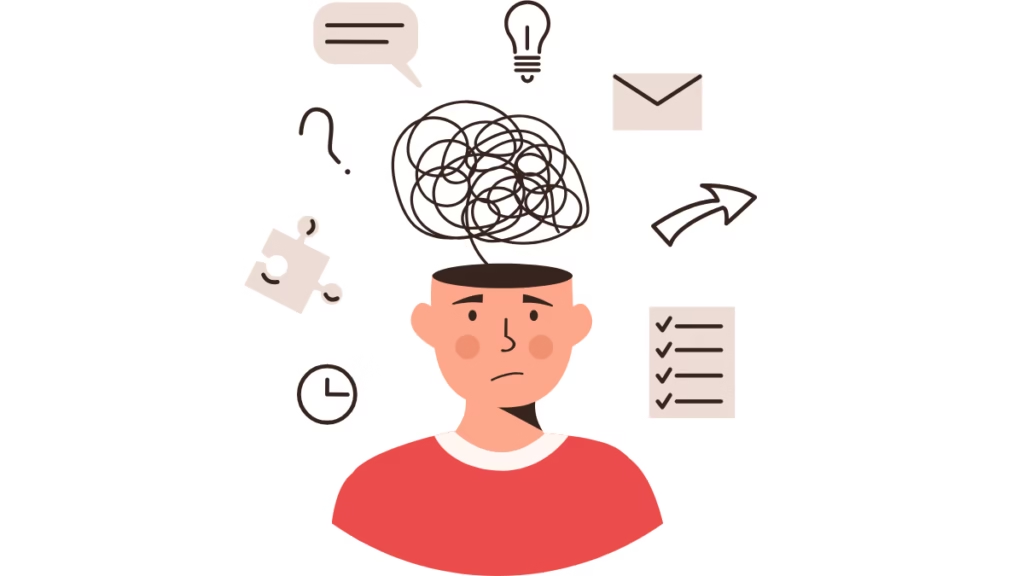How to Improve Focus and Concentration Naturally (9 Proven Tips)
If your mind drifts, your clarity fades, or you struggle to stay locked into deep work—this isn’t a willpower issue. It’s the result of overstimulation, poor inputs, and misaligned habits. This article shows you how to improve focus naturally, without relying on shortcuts.
These are high-performance adjustments backed by neuroscience, built for ambitious individuals who want sustainable attention, mental clarity, and meaningful execution.
Whether you’re trying to increase your attention span or reduce mental fog, it starts here—with precision.
The Cost of Overstimulation and Short Attention Spans
Modern life fractures attention by design.
Constant digital interruptions and fragmented workflows wear down your cognitive stamina. Neuroscience shows that this overstimulation weakens executive function, reduces mental clarity, and makes it harder to sustain deep concentration.
Over time, your ability to enter meaningful work states erodes—not because you lack discipline, but because your inputs are misaligned with performance.
The Default Mode Network (DMN), which activates during idle moments, becomes more dominant when focus is weak—causing your mind to wander. Digital distractions strengthen this pattern, making it harder to enter flow states.
Learning how to improve focus naturally means rewiring this loop through better inputs, structure, and intention.
Neurobiology of Focus: Dopamine, Brainwaves, and Fatigue
Understanding the neurobiology behind focus empowers better choices. Dopamine regulates motivation and reward. When it’s constantly spiked by short-form content, your baseline ability to focus on longer tasks degrades.
Natural strategies like mindful breathing, structured routines, and environment design can restore this balance—supporting cognitive stamina, deep work, and creative flow.
The science is clear: you can train your brain to improve focus naturally by managing both internal chemistry and external conditions.


1. Master Your Morning Inputs
Why mornings matter for mental clarity
Cortisol and dopamine levels spike early, meaning your first actions either prime or pollute your mental state. If you begin with chaos—scrolling, emails, or reactive tasks—you sacrifice momentum before the day begins.
What to avoid (and what to prime)
Avoid digital stimulation early. Instead, hydrate, get natural sunlight, breathe deeply, and begin with a few minutes of stillness. To begin improving focus naturally, start with what you do in the first 30 minutes of your day.
2. Use Time Blocks and Single-Tasking
The power of time boundaries
Time blocking provides structure for sustained attention. By assigning tasks to defined windows, you reduce overwhelm and allow the mind to enter deep focus states.
Replacing multitasking with structure
Multitasking fragments attention and increases mental residue. Instead, use deep work or even the Pomodoro Technique—25 minutes of focus followed by 5 minutes of rest.
Those are both foundational methods if you’re trying to figure out how to improve focus naturally in a modern world filled with distraction—especially if you’re a student trying to enter a flow state to study.
3. Train Your Brain With Meditation or Breathwork
Rewiring your baseline focus
Meditation increases gray matter in regions tied to executive function. Breathwork reduces cortisol, enhancing clarity.
A few minutes of mindful breathing trains your brain to operate in more intentional states—key if you’re learning how to improve focus naturally without relying on external stimulants.
Practices that fit real workdays
Even 5–10 minutes of daily mindfulness can recondition your mental baseline. Apps like Insight Timer, Headspace, or Breathwrk offer routines that fit seamlessly into workdays.
4. Optimize Nutrition for Cognitive Fuel
Brain-supporting nutrients and habits
Your brain runs on what you feed it. Nutrients like omega-3s, B vitamins, choline, and antioxidants have been shown to support memory, attention, and long-term cognitive health.
Meanwhile, excessive sugar, ultra-processed foods, and poor hydration can dull mental clarity and increase brain fog.
Foods that hurt (and help) your attention span
If you’re looking at how to improve focus naturally through diet, there’s no one-size-fits-all prescription.
While research supports certain brain-friendly foods—fatty fish, leafy greens, eggs, and berries—many high-performers find clarity through experimentation. Some thrive on high-fat, low-carb protocols.
Others operate best with balanced carbs or even red meat-heavy diets. The key is precision: track what sustains your energy, sharpens your thinking, and reduces mental crashes. Hydration remains universal—your brain is 70% water. Drink accordingly.
5. Reduce Digital Dopamine and Distractions
How overstimulation drains focus
Digital environments are built to hijack attention. Every ping, Tiktok, or headline delivers a dopamine hit, making sustained tasks feel dull by comparison. This reshapes your reward circuitry, making deep work more difficult to access or sustain—especially if you haven’t built systems to protect it from constant stimulation.
Reclaiming control of your inputs
Adopt digital minimalism. Disable notifications, use grayscale screens, and schedule specific times for content consumption. Tools like One Sec or Freedom help create intentional boundaries.


6. Build an Environment That Promotes Focus
Physical clarity = mental clarity
Your space shapes your cognition. Cluttered desks introduce visual noise that splits attention. Clean, intentional setups foster control, stillness, and precision—exactly the conditions required to enter a flow state while working and maintain concentration.
Desk setup, light, and ambient noise strategies
Position your desk near natural light. Use ambient sound tools like Brain.fm or brown noise playlists to maintain rhythm.
Noise-cancelling headphones or acoustic panels can minimize interruptions. Remove any item that doesn’t serve your focus identity. It’s one of the most practical steps in learning how to improve focus naturally in your daily environment.
7. Improve Sleep Quality and Consistency
Sleep’s direct link to focus performance
Sleep is the foundation of cognition. Memory consolidation, hormone regulation, and emotional control all depend on it. Even partial sleep deprivation leads to slower cognition and emotional volatility. Without rest, you can’t perform at your peak.
Evening inputs that improve recovery
Create an evening wind-down system. Stop screens 60 minutes before bed. Dim lighting, stretch, and journal. Supplement with magnesium or herbal teas if necessary.
Keep a consistent sleep-wake time to strengthen your circadian rhythm. It’s you’re seriously wondering how to improve focus naturally it’s a non-negotiable.
8. Move Daily (But Not Excessively)
Why physical motion boosts cognition
Exercise increases blood flow to the brain, stimulates endorphins, and supports neurogenesis. It’s not just for health—it’s a focus enhancer. Even a 10-minute walk can reset your cognitive baseline.
How to balance activity with output
Use low-impact movement to recharge between work blocks. Walking meetings, desk stretches, or short yoga sessions preserve mental energy. Save high-intensity workouts for non-work hours to avoid focus dips.
9. Track Focus and Build Awareness Over Time
Self-observation sharpens attention
Focus isn’t just trained—it’s observed. When you track how, when, and why your focus fluctuates, you reclaim control over it. Pattern recognition allows better intervention.
Tools and questions to build insight
Use tools like RescueTime or Notion journals to log your daily energy peaks and dips. Ask: When did I feel most focused? What preceded it? What distracted me? When learning how to improve focus naturally, this feedback loop is essential.


Mistakes That Reduce Mental Clarity (And How to Avoid Them)
Working against your chronotype
Forcing deep work at your biological low points is counterproductive. Syncing with your natural energy curve will multiply results.
Not having a recovery system in place
Focus is cyclical. Without rest, it deteriorates. Reflection, meditation, and walks aren’t a waste of time. They’re strategic recovery inputs. They are how you stay sharp—consistently.
Final Thoughts on How to Improve Focus and Concentration Naturally
Focus is a system—refine it, don’t chase it
You don’t need more noise or productivity gimmicks. You need structure, intention, and consistency. Knowing how to improve focus naturally gives you control back—not through tricks, but through training.
Commit to one change, track it, and iterate
Start small. Pick one tip—maybe morning clarity or tech detox—and track it for a week. Mastery doesn’t come from trying everything. It comes from applying one change until it becomes part of your identity.
Frequently Asked Questions
What is the most effective way to improve focus naturally?
The most effective way to improve focus naturally is by optimizing your foundational inputs: sleep, nutrition, morning routine, and digital environment. Together, these regulate your brain’s dopamine and energy rhythms, which directly impact focus. Structured work blocks and mindfulness practices also help sustain deep concentration.
How can I train my brain to focus better without medication?
You can train your brain to focus better by using consistent routines that reinforce attention. This includes meditation, breathwork, reducing digital distractions, and tracking your focus patterns. Over time, your brain adapts—strengthening the neural pathways that support deep work and long-form thinking.
Which foods help improve concentration and mental clarity?
There’s no universal diet for mental clarity. While research supports foods like fatty fish (omega-3s), berries, eggs, and leafy greens, the truth is: focus nutrition is personal. Some perform best on high-carb diets, others thrive on carnivore or keto. The key is to experiment, track how you feel, and find what sustains your attention and energy long term. That’s how to improve focus naturally—through intentional testing, not trends.
Can you improve focus naturally without changing your entire routine?
Yes. Even one change—like avoiding screens for 30 minutes after waking or using a time-blocking method—can make a noticeable difference. Improving focus naturally doesn’t require a complete lifestyle overhaul; it’s about consistent, intentional upgrades over time.
How does sleep impact natural focus?
Sleep is one of the most powerful tools for natural focus. It consolidates memory, regulates hormones, and restores your brain’s executive function. Poor sleep quickly leads to attention deficits, emotional volatility, and mental fatigue—making it nearly impossible to enter flow states.
Is meditation necessary to improve focus naturally?
While not mandatory, meditation is one of the fastest ways to improve focus naturally. It increases gray matter in brain areas linked to attention and executive control. Even 5–10 minutes a day can dramatically reduce distractions and boost cognitive endurance.






